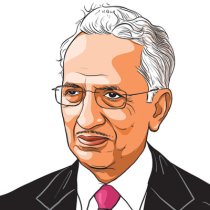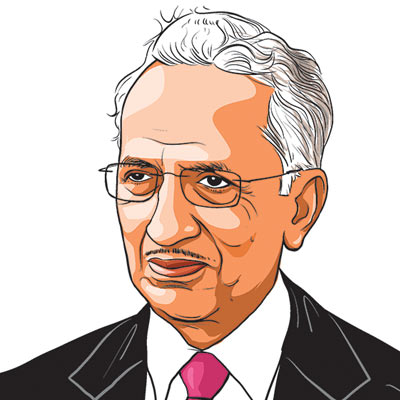Breaking the cage
The CBI needs to undergo structural reforms to do its job well.

The crisis within the CBI started building up in October 2017 when the director, Alok Verma (right), opposed the appointment of Rakesh Asthana (left) as special director in the CBI on the ground that he did not have a clean image.
The Central Bureau of Investigation (CBI) has from time to time courted controversies and criticism for its handling of politically sensitive cases. In important cases, the organisation has generally toed the government line. No wonder, it was described by a former Chief Justice of India as a “caged parrot”. However, it is for the first time that the CBI finds itself in a quagmire due to an internecine feud among its top officers.
The Supreme Court has, over the years, been trying to insulate the CBI from political pressures and, in the process, give it a measure of autonomy. In Vineet Narayan vs. Union of India (1998), the apex court laid down that the director, CBI shall be appointed on the recommendation of a committee comprising the Central Vigilance Commissioner, vigilance commissioners, secretary (home) and secretary (personnel), and that he shall have a minimum tenure of two years. The CVC was given statutory status and authorised to exercise superintendence over the CBI in the investigation of offences committed under the Prevention of Corruption Act. Justice J S Verma, author of the aforesaid judgment, was however distressed to record in 2009 that “even now the CBI continues to disappoint the people whenever it deals with cases against the powerful”.
The Lokpal Act, 2013, modified the procedure for the selection of director CBI; it prescribed that he shall be appointed on the recommendation of a committee comprising the Prime Minister, Leader of the Opposition in the Lok Sabha and Chief Justice of India or a judge of the Supreme Court nominated by him. Alok Verma was appointed as director CBI by such a committee.
The crisis within the CBI started building up in October 2017 when the director, Alok Verma, opposed the appointment of Rakesh Asthana as special director in the CBI on the ground that he did not have a clean image. The CVC, however, supported Asthana with the result that he was elevated to the rank of special director, CBI. Fireworks started thereafter. Unfortunately, the Ministry of Personnel, under whom the CBI is placed, did nothing to douse the fires. The CVC also remained a mute spectator. It was only when things started getting out of hand that, on October 23, the CVC wrote to the government that allegations against the director were serious and that he should be divested of all powers. On October 24, the government intervened and, in the “interest of equality, fair play and principles of natural justice”, decided to send both the director and the special director on forced leave, and appointed Nageshwar Rao as the interim director.
The government’s handling of the matter has been far from satisfactory. It could have intervened in the initial stages and nipped the trouble in the bud. It was also unfortunate that government appointed as interim director a person whose own integrity is said to be suspect. The conduct of the CVC did not inspire confidence either. He gave the impression of having been pre-disposed towards Asthana at every stage. He blamed Verma for not cooperating and being non-compliant but downplayed the misconduct of Asthana, who was accused by the CBI of running an extortion racket in the garb of investigations.
The two principal actors in the sordid drama — Alok Verma and Rakesh Asthana — of course did not conduct themselves in a graceful manner. Verma’s leadership of the organisation leaves much to be desired. Asthana was the rampaging bull in the CBI shop. Nageshwar Rao, behaving like an ek din ka sultan, carried out transfers which were manifestly mala fide. The opposition parties are regrettably trying to make political capital and Rafale-ise the controversy.
The Supreme Court has applied the healing touch. It has asked the CVC to complete inquiry into the allegations against director, CBI within a period of two weeks. Significantly, the Court also ordered a retired apex court judge to supervise the inquiry. The Court has justifiably clipped the wings of the interim director by laying down that he shall attend only to routine matters and not take any policy decisions. Copies of all orders issued by him are to be placed before the Supreme Court in a sealed cover at the next hearing.
The judicial intervention would hopefully set the CBI house in order. However, structural reforms is what the CBI needs from a long-term point of view. It is ridiculous that India’s premier investigating agency was constituted through a resolution passed on April 1, 1963 and that the agency derives its power to investigate from the Delhi Special Police Establishment Act of 1946. As far back as 1978, the L P Singh committee recommended enactment of a “comprehensive central legislation to remove the deficiency of not having a central investigative agency with a self-sufficient statutory charter of duties and functions”. The Second Administrative Reforms Commission (2007) also suggested that “a new law should be enacted to govern the working of the CBI”. The 19th and 24th reports of the parliamentary standing committees (2007 and 2008) recommended that “the need of the hour is to strengthen the CBI in terms of legal mandate, infrastructure and resources”. The 24th report also expressed itself in favour of CBI taking suo motu cognisance of crimes, and said that this would in no way affect the essentials of our federal structure. It is high time that the CBI is vested with the required legal mandate and is given pan-India jurisdiction. It must have inherent powers to investigate corruption cases against officers of All India Services irrespective of the assignments they are holding or the state they are serving in.
The government would now do well to restore the institutional integrity of the CBI and give it the necessary autonomy so that it inspires public confidence.
The writer, formerly director general BSF, is presently chairman, Indian Police Foundation.
For all the latest Opinion News, download Indian Express App
More From Prakash Singh
- Hold out an olive branchGovernment today again holds upper hand vis a vis Naxals. It’s the best time to make peace ..
- Towards a people’s policeThe police force needs to be freed from the stranglehold of the executive and given functional autonomy to enforce the rule of law. The Supreme…
- A case of selective outrageKathua and Unnao incidents are barbaric, but calling these the darkest hour since Independence is an overstatement...








































No hay comentarios:
Publicar un comentario